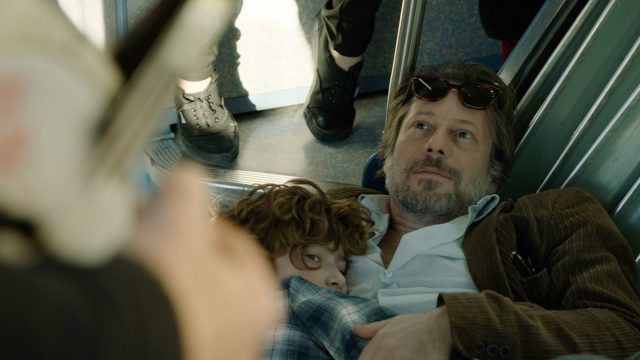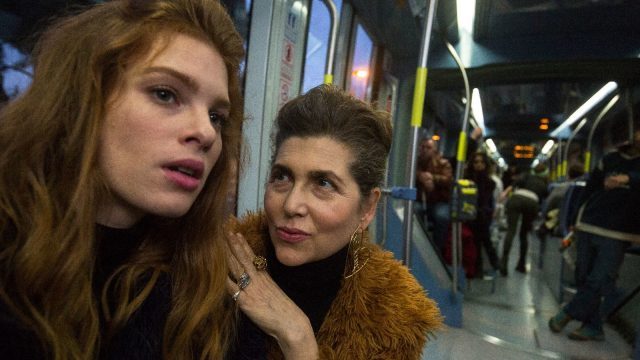
Mathieu Amalric and his real-life son listen to a busker in Amos Gitai’s A Tramway in Jerusalem
A TRAMWAY IN JERUSALEM (Amos Gitai, 2018)
Walter Reade Theater, Film Society of Lincoln Center
165 West 65th St. between Broadway & Amsterdam Aves.
Saturday, January 12, 7:00, and Sunday, January 13, 3:45
Festival runs January 9-22
212-875-5050
www.filmlinc.org
thejewishmuseum.org
Israeli auteur Amos Gitai makes a subtle plea for peace and equality in A Tramway in Jerusalem, having its US premiere January 12-13 at the New York Jewish Film Festival. The ninety-four-minute movie consists of a series of scenes shot along Jerusalem’s Light Rail Red Line, a tram shuttling passengers between the northeast and the southwest, stopping in such locations as Beit Hanina, Shu’afat, Ammunition Hill, Damascus Gate, Jaffa, and the Central Bus Station. The tram is a place where men, women, and children of all religious denominations, races, genders, classes, and nationalities exist on the same level, paying the same fare, no one receiving priority treatment as the tram moves from Palestinian to Israeli neighborhoods, from day into night. In the scripted Israeli-French coproduction, Gitai and cowriter Marie-Jose Sanselme create humorous, poignant, and occasionally cringeworthy scenarios featuring approximately three dozen actors, many of whom have appeared in such previous Gitai works as Kadosh, Kippur, Free Zone, and Kedma. Each scene is shot continuously by cinematographer Eric Gautier, with no cuts, essentially making the viewer a passenger on the tram, watching the goings-on in real time.

Two friends bump into each other and share intimate details of their lives in A Tramway in Jerusalem
The film opens with Israeli vocalist Noa (Achinoam Nini) singing the Hebrew song “Etz Chayim” (“The Tree of Life”) in extreme closeup as she looks out the window of the tram, outlining Gitai’s purpose. “It is a tree of life for those who cling to it / and those who uphold it are happy / Its ways are pleasant / and all of its paths peaceful,” she sings in Hebrew. A group of Orthodox men enthusiastically chants prayer and song, declaring, “The world is a very narrow bridge / But what’s really important / is not to be afraid / not afraid at all.” The new coach of a youth soccer team can’t get a word in edgewise as the manager hogs the spotlight with a reporter. A Muslim man complains about the Oslo Accords. A woman speaks about very intimate personal matters with a friend. A priest (Italian actor and director Pippo Delbono) mumbles about love and freedom. A man (French star Mathieu Amalric) and his son (Pierre Amalric) watch a strumming musician; later, the man reads passages Gustave Flaubert wrote about his journey to Israel with Maxime Du Camp, such as the following: “Jerusalem feels like a fortified mass grave, where old religions are silently rotting.” A security guard wanders through the tram, a reminder of the nation’s ills and ever-present dangers, particularly on public transportation. An ugly scene between a husband and wife about an affair is one of several moments that feel too random and out of place. It is all brought together smoothly by editor Yuval Orr and an evocative score by Louis Sclavis and Alex Claude, with each section separated by a black screen imprinted with the time of day (but not chronological). To avoid getting too claustrophobic, Gitai occasionally films outside the train, but only on the platform.
Gitai made A Tramway in Jerusalem on board a regularly scheduled tram, taking up two cars with the rail’s permission, although he did not get official government consent, partially because he has been openly critical of the current administration and Minister of Culture Miri Regev, who Gitai believes is reducing Israeli cinema to a propaganda machine. Israel’s diversity is represented by a diverse cast, which also includes Hana Laszlo, Yaël Abecassis, Yuval Scharf, Karen Mor, Lamis Ammar, and Mustafa Masi, speaking Hebrew, English, French, German, or Arabic. Gitai (Rabin, the Last Day; West of the Jordan River) is very clear about what he hopes to accomplish with the film. “A Tramway in Jerusalem is an optimistic and ironic metaphor of the divided city of Jerusalem in which we, Israelis, Palestinians, and others, try to simulate how life can happen in this microcosm or ‘sardine can’ of a tramway, in the utopian days to come,” he explains in his director’s statement. “Beyond the current days of conflict and violence, how can people accept each other’s existence, their differences and disputes, with no killing. Is this tram the sign that a peaceful coexistence is possible?” A Tramway in Jerusalem is screening January 12 at 7:00 and January 13 at 3:45 at the Walter Reade Theater, with Gitai participating in Q&As after each show. A joint presentation of the Film Society of Lincoln Center and the Jewish Museum, the New York Jewish Film Festival runs January 9-22, with such other films as Eric Barbier’s opening night Promise at Dawn, Yehonatan Indursky’s centerpiece Autonomies, and Bille August’s closing night A Fortunate Man.